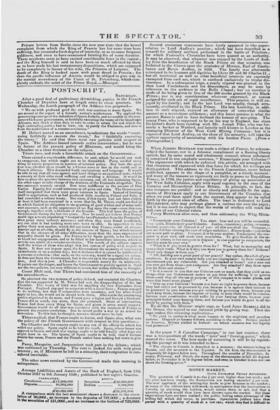POSTSCRIPT.
SATURDAY.
After a good deal of preliminary skirmishing, parties in the French Chamber of Deputies . have at length come to close quarters. On Wednesday, the fourth paragraph of the Address was proposed- " We lee with profound grief the civil war continue to waste Spain. We are moved at the aspect of a friendly nation's misfortunes. We applaud the persevering courage of the defenders of Queen Isabella, and we confide in the mea- sures whirl) your government, in faithfully executing the treaty oft he Quadruple Alliance, may 'hill it their duty to take in order to attain the end which the high contracting parties had in view, viz. to pacify the Peninsula, and save it from the misfortunes of a counter-revolution."
M. Hebert moved as an amendment, to substitute the words "conti- nuing faithfully to execute the treaty," for " faithfully executing the treaty." He said that there were two policies with respect to Spain. The Address leaned towards active intervention ; but he was in favour of the present policy of Ministers, and would bring the Chamber to is clear decision on the subject.
Thiers ruse, and made a formidable attack on the Government— There existed a considerable difference, lie said, which 'he would not seek to exaggerate, but which ought not to be dissembled. Party swelled eve!y thing to untrue proportion in matters of internal policy. But here the ques- tion was, whether there should be a Crown more or less in the world, and in French alliance. This demanded frank explanations and language. It would be idle to say that all were agreed, and have things in an equivocal state, whilst a country at their sides stood suffering and awaiting a decision. It would be false to place the question between two extremes, one all but disdaining Spain, the other eager to take charge of the destinies of the Peninsula altogether. The two extremes scarcely existed. Few were indifferent to the success of Don Carlos. Equally few would intervene at all price and risks. The Government itself recognized that there were great interests iu Spain. Instead of limiting itself to negotiation, such as had produced little results in Poland and Italy, it bad concluded a solemn treaty. But since, if this treaty bad not been eluded, at least it hail been construed in a sense that he, M. Thiers, could not find in it, which limited its obligation to the granting of good wishes and of some indi- rect succours, such as the appearance of our flag upon the coast—even this rare enough, together with a blockade of the frontier. This had been the policy of Government during the last two years. Now be could not believe that France could sign a treaty stipulating "to expel the two Pretenders from the Peninsula," then grant some indirect succours; and when they were found iusufficient, cry out that it had nothing more save vows to offer. In opposition to this policy there was another, which did not insist that France, under all circum- stances and at all risks, should fly to the succour of Spain ; but which insisted that in the absence of all other difficulties, more than the mere expression of sympathy should be given. For France to let Spain poisb, is for the former to break her engagements, and to be blind to her immediate interests, which in nowise can admit of a counter-revolution. 'I he words of the address express well the wishes of those who adopt this last system of policy with respect to Spain. It dues not impose upon the Government the necessity ef informing immediately or on a certain day; but it declares that it caunut Le indifferent to a counter-revolution—that such, on the contrary, would be a signal for acting. It does not force the Government, but it throws on it the responsibility of inac- tion. And this is just. A Chamber is responsible merely for its seutiments. It points out the danger, and leaves the Government to provide against it. Such are the two policies, not very different in terms, but widely differing in thought.
Count Mule said, that Thiers had convinced him of the necessity of the amendment— He admitted the two systems of policy defined, and reminded the Chamber, that the one supported by M. Thiers had met the disapprobation of the last Chamber. The treaty of 11834 was fur expelling the two Pretenders from Portugal. England engaged to cooperate with a naval force ; France engaged to do nothing, but that if cooperation were necessary, and her allies would apply to her, she would act in accord with them. Afterwards the contracting parties stipulated to do more, and France gave a legion and formed a blockade. France did as much, nay more, than she promised. Short of intervention, France had done every thing for Spain, and given it every moral support. Government would do all that was consistent with the interests of France to prevent the counter-ievolution. But he would prefer a war to an armed in- tervention. To this last, he thought, recourse should never be had.
Thiers replied, that France ought to know, and Spain also, what was the policy of the French Government with respect to this question— The Chamber and the country ought to step out of the official lie which has veiled our policy. Spain ought to be told the truth. Spain, where breast was opposed to breast, and civil war raging, ought to be told frankly what hope she might have in us. The Queen' of Spain ought to be told, that if fortune deserts her cause, France and the French nation have nothing but vows to give her.
Passy, Mauguire, and Jacqueminot took part in the debate; which was continued on Thursday. The vote is looked for with very great _ interest ; as, if Ministers be left in a minority, their resignation is con- sidered inevitable.


























 Previous page
Previous page